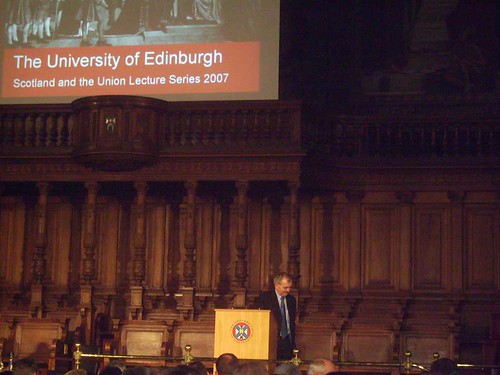Scotland and the Union
Union and Empire: Good for Scotland?
Professor Tom Devine, Chair Richard Holloway
Edinburgh University have scheduled a series of lectures and debates around the topic of the 300th anniversary of the Act of Union. The anniversary has come at a time when debate around the future of the Union has grown intense. The forthcoming Scottish elections have the prospect of seeing an SNP-led administration being formed, or at least of the SNP being the biggest party in the parliament. A referendum on independence is a real possibility for the first time, although the lib-dems today seemed to rule out supporting it therefore raising the spectre of a labour/lib-dem minority coalition. Interesting times anyway.
All of this doubtless helped filled the seats in the opulent environment of Edinburgh University's McEwan Hall.
Tom Devine pulled no punches in his contribution and there was something there to upset everyone, or to confirm their views. But that is history for you. He certainly flagged up the disproportionate contribution of Scots to the British Empire as administrators, engineers and soldiers. For example one third of colonial governors between 1850 and 1939 were Scots. Scotland itself saw an expansion of industry on the back of the Empire. Ship-building, steel and coal were all inter-related industries. Jute and cotton also expanded on the basis of the plundered raw materials of India. Devine argued that Scotland had a case of "mass amnesia" over its contribution to Empire.
But what was clear was that this massive wealth was not spread around and most Scots, far from benefiting, lived in positions of poverty and insecurity. Whilst the wealthy few bought up huge tracts of land and invested in grand building schemes most Scots lived in abject poverty. In 1867 two-thirds of Scots were unskilled labourers and two million lived in over-crowded conditions by the outbreak of the First World War. Millions emigrated abroad to seek a better life with only the Irish and Norwegians seeing a bigger proportion of their countrymen emigrate.
The army was one job option. Scots were used as imperial cannon-fodder and a 'martial spirit' was evoked. Perhaps because of this 30,000 Glaswegians signed up to fight WW1 by 1916. Devine argued that there was "an unrelenting use of Scots regiments as shock troops in battles". Losses were severe and one estimate is that Scotland lost more per head of population in the war than any other nation with the exception of Turkey and Serbia.
And the future? "The future isn't really my period" said the Professor.
τ
:: | 3:16 pm | | ||
0 Comments:
This is an archived story. See current posts here!



